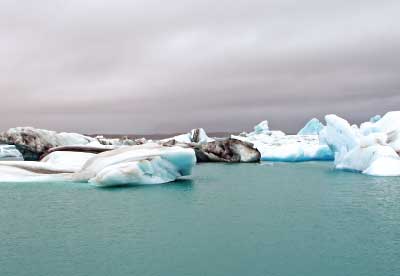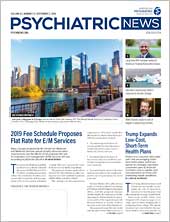Climate change, caused by human activity, is “an indubitable scientific fact,” say seven psychiatric educators in a “call to action” published in the most recent edition of Academic Psychiatry.
“Climate change has the potential to catastrophically impact planetary and public health,” wrote lead author John Coverdale, M.D., a professor of psychiatry and behavioral sciences at Baylor College of Medicine, and colleagues. “Psychiatric professional organizations and psychiatric departments and every single member of the psychiatric profession have fiduciary obligations to the public. We and our departments and organizations are trusted and influential role models. We should therefore embrace with enthusiasm this critical opportunity for leadership in attending the very serious threats posed by climate change.”
Coverdale is deputy editor of Academic Psychiatry.
The call to action is a striking statement by some of the nation’s leading academic psychiatrists, including Richard Balon, M.D., director of the adult psychiatry training program at Wayne State University; Eugene Beresin, M.D., senior educator in child and adolescent psychiatry at Massachusetts General Hospital for Children; Adam Brenner, M.D., director of psychiatry training and vice chair for education at the University of Texas Southwestern Medical Center; Anthony Guerrero, M.D., chair of psychiatry at the University of Hawaii; Alan Louie, M.D., director of education in the Department of Psychiatry and Behavioral Sciences at Stanford University; and Laura Roberts, M.D., chair of the Department of Psychiatry and Behavioral Sciences at Stanford and editor in chief of the APA Publishing Books Division.
The call to action outlines scientific data on climate change; mental health effects of climate change; and clinical, administrative, research, and educational initiatives that psychiatry can undertake.
It is accompanied in the journal by a commentary by APA President Altha Stewart, M.D. “APA recognizes the importance of working in this area [of climate change] and will co ntinue these efforts through its existing components, as well as through alliances with other organizations,” Stewart wrote. “If indeed climate change is the biggest global health threat of this century, then we have an obligation to make concerted efforts to mitigate its effects.”
In comments to Psychiatric News, Coverdale said he believes psychiatrists, and especially psychiatric educators, have a critical opportunity to act as leaders in responding to the threats associated with climate change. “Yet there has been a perplexing general lack of attention on climate change in psychiatry publications,” he said. “The journal Academic Psychiatry is perfectly poised for this leadership role because the associated challenges relate to the journal’s mission including to improve knowledge in and stimulate evidence-based advances in key domains such as education, leadership, finance and administration, career and professional development, ethics and professionalism, and health and well-being.”
Coverdale told Psychiatric News that medical schools and academic medical centers can create pathways for select members of the profession to specialize in the study of climate change including its psychological, psychiatric, and social aspects. “It might be of value for medical schools to employ climatologists to assist in meeting these goals,” he said.
Psychiatrists concerned about climate change say that the call to action is timely and that medical schools and residency programs have a special responsibility to respond. “Putting climate health into our medical school and residency curriculae is as important as teaching young physicians about the impact of tobacco, diabetes, or hypertension and should be rapidly implemented by the ACGME [Accreditation Council for Graduate Medical Education],” said Elizabeth Haase, M.D., an associate professor of psychiatry at the University of Nevada at Reno School of Medicine.
Haase is on the steering committee of Climate Psychiatry Alliance (CPA), a group of APA members that have coalesced around the issue of climate change and mental health (see box above). She is also chair of the Group for the Advancement of Psychiatry (GAP) Climate Committee.
She said the urgency of climate change calls for radical measures. “If we know that giving a patient an electric bicycle improves both their immediate health and the long-term viability of their environment, should we not be able to write a prescription for an electric bike? How do we reward sustainable health measures in a disease-based profit model? Why not promote industries like bike manufacturing in our health care expenditure, instead of drugs for obesity?”
Haase said APA needs to provide leadership on how to lower the carbon footprint of the profession without compromising care. “Altha Stewart in her editorial and others highlight that telepsychiatry and decreasing the number of professional conferences are ways to lower fossil fuel use,” Haase said. “How should clinicians balance the sustainability costs of maintaining a heated staffed facility against the possibility of suicide for an acute patient? Will an online consultant, an app, or some other means of contact do just as well?”
Medical consensus around the critical nature of climate change appears to be growing. How would Coverdale respond to those who insist that climate is outside the purview of psychiatrists and psychiatry?
“The medical and mental health effects associated with climate change are serious and potentially catastrophic,” he said. “Especially vulnerable populations include the homeless, the poor, the mentally ill, children, and the elderly. Climate change should therefore be very high on the agenda of our academic missions.”
He added, “We need to be developing the policies of our professional societies and academic departments to support initiatives that counter climate change. We all should think about how we can lower our own carbon footprints and recognize that as role models we have an opportunity to influence others’ behaviors. Moreover, we should learn how to effectively communicate the key issues at stake to members of the public including politicians and patients.” ■
“Climate Change: A Call to Action for the Psychiatric Profession” can be accessed
here. “Psychiatry’s Role in Responding to Climate Change” is available
here.



